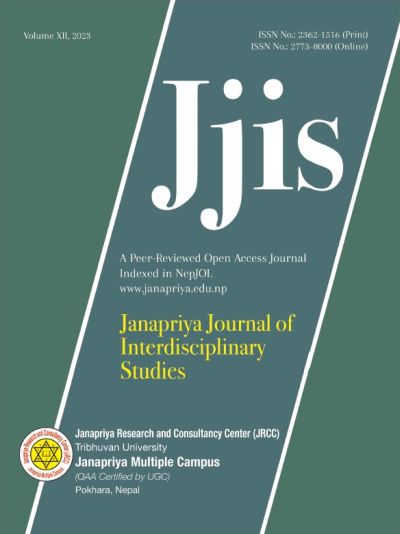Interpersonal Psychological Theory of Suicide in Understanding Suicidal Behavior among Adolescents in Nepal
DOI:
https://doi.org/10.3126/jjis.v12i1.62256Keywords:
Adolescents, Suicide, Internpersonal Psycological Theory, NepalAbstract
Suicidal behavior, a global public health issue, is one of the prevalent problems among adolescents in Nepal with highest rate of suicidal ideation and higher rates of suicidal attempt among the countries of South East Asia Region (SEAR). The Interpersonal psychological theory of suicide (IPTS) is a widely used and well-known theory that provides an interpersonal psychological framework which can contribute in understanding suicidal behavior. Although its application is found in international level, the lack of knowledge remains among Nepalese adolescents. Hence, this review is aimed to assess the applicability of IPTS in understanding suicidal behavior of adolescents in Nepal. A literature search was conducted using electronic databases (PubMed, Hinari, Nepjol, Research gate, and Google scholar). A scoping review of the articles published in peer-reviewed journals and grey literatures was done. We used the Preferred Reporting Items for Systematic Review and Meta-analysis Extension for Scoping Reviews (PRISMA-ScR) in reporting the review and six-step process recommended by Arksey and O’Malley (2005) was adopted. Boolean operators (AND, OR, NOT) were used in search strategy which helped in combining key terms. The studies which assessed the relation between the constructs of IPTS i.e., thwarted belongingness, perceived burdensomeness and suicidal behavior among adolescents in Nepal were included, i.e., 14 studies which met the inclusion criteria.The findings revealed various risk factors which support the use of IPTS as those relate with the constructs of thwarted belongingness and perceived burdensomeness to explain suicidal behaviors among adolescents. Therefore, the findings indicated the use of the framework provided by IPTS in understanding suicidal behavior among Nepalese adolescents as well as highlighted the importance of interpersonal risk factors to prevent suicidal behavior.
Downloads
Downloads
Published
How to Cite
Issue
Section
License
Copyright (c) 2023 The Author(s)

This work is licensed under a Creative Commons Attribution-NonCommercial 4.0 International License.




